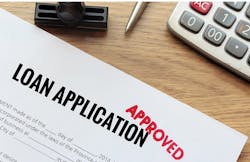How to Capitalize on Coronavirus-related Loan Options
Buddy Carter didn’t mince words.
“Uncharted waters is what we’re in right now,” the Republican Congressman said during a recent webinar hosted by the Automotive Service Association.
The United States has never faced an obstacle quite like the coronavirus outbreak, Carter noted. So he can empathize with business owners like those that operate body shops.
“This has never happened to any of us before,” Carter said. “And a lot of business owners, particularly small business owners, there’s a lot of uncertainty as to what the future holds for them. They don’t know whether they’re going to continue to be viable.”
Fortunately, Carter’s meeting with the media that day wasn’t all doom and gloom. He was there to offer advice. Carter specifically discussed the U.S.’s third coronavirus stimulus package, the Coronavirus Aid, Relief and Economic Security (CARES) Act, a $2 trillion dollar program that included increased funding and relief for small businesses along with loan forgiveness programs. In late April, an additional, nearly $500-billion coronavirus relief bill was agreed to by Congress and President Donald Trump that was designed to further aid small businesses.
Now, in May, the fact remains: body shop owners need to maintain consistent communication with lenders so they can get their business the financial aid it needs.
“Hopefully we have given [small business owners] some reason for optimism in passing the coronavirus relief package,” said Carter, a Republican representing Georgia’s 1st congressional district. “We’re trying to make sure that the employee-employer relationship remains there.”
The third coronavirus stimulus package included two key elements: the Paycheck Protection Program (PPP) and the Economic Injury Disaster Loan (EIDL). Meanwhile, another lending option is now being recommended by some financial experts: the Main Street Lending Program. Here’s a breakdown of those programs:
The PPP: The Paycheck Protection Program was created to help small businesses pay their employees during the COVID-19 crisis, though PPP relief money initially ran out by mid April, less than two weeks after the application process opened.
The PPP was set up as such: The program’s loan amounts will be forgiven, as long as the loan proceeds are used to cover payroll costs, and most mortgage interest, rent, and utility costs over the 8-week period after the loan was made; and employee and compensation levels were maintained. Payroll costs are capped at $100,000 on an annualized basis for each employee, and the associated loan payments will be deferred for 6 months.
The late-April agreement between Congress and the President earmarked $331 billion to boost the small business payroll loan program (for more information, visit sba.gov).
“We’ve found that local and community banks are the best option when it comes to PPP loans,” said Brad Mewes, a financial consultant who recently launched COVID19loans.org. “The bigger banks have had challenges quickly processing applications where the smaller local banks are making huge efforts for account holders.”
The EIDL: The Economic Injury Disaster Loan Program is meant to aid businesses that suffer substantial economic injury as a result of a declared disaster, regardless of whether the applicant sustained physical damage. An EIDL permits businesses to maintain a reasonable working capital position during the period affected by disaster. An EIDL does not, however, replace lost sales or revenue.
Some business owners applied for the EIDL in recent weeks but reported delays. According to a report by geekwire.com, the delays were due in part to capacity; the SBA facilitated 63,000 loans worth approximately $28 billion in the entire fiscal year 2019. Now the organization is attempting to lend at least nine times that amount in the span of mere weeks.
A new stimulus deal is expected to add $60 billion to the EIDL. More information about EIDLs can be found by visiting diasterloan.sba.gov.
Main Street Lending Program: This Federal Reserve utility has been bolstered in response to coronavirus. Banks will make loans to eligible small and medium-sized businesses and the Fed will then purchase 95 percent of the loan via a special-purpose vehicle, according to a Reuters report.
“The new Main Street loan program allows for loans up to $25 million for a 4-year term and an adjustable rate, which will range from 2.6 percent to 4.6 percent,” explained Stuart Sorkin, founder of business consulting firm The Business and Legal Advisors.
If shop owners are running into issues with lending, ASA executive director Ray Fisher encouraged members to reach out to the organization’s leaders so they can provide assistance.
And Fisher, as well as Carter, emphasized that now is the time for shop owners to leave their egos at their doorstep and accept assistance.
The aforementioned business loans, Carter noted, “give us the opportunity to get money into the hands of small businesses so that they can stay liquid. This is not a bailout. … I know your employees are so important to you, and you want to keep those employees. And we’re trying to keep them on your payroll.”

